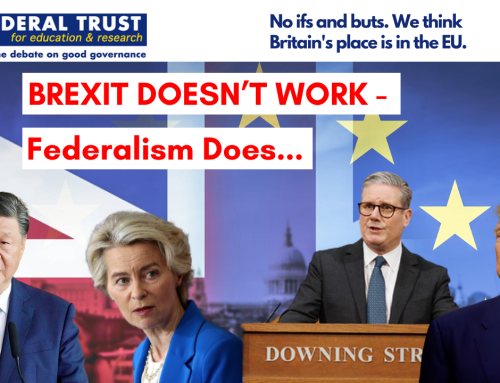There is a mystery for me in contemplating the political career of Nicola Surgeon. I first faced this during the 2015 General Election, which I spent largely in Scotland, campaigning for Unionist friends. I was hoping to see the “No” campaign victory in the 2014 referendum (in which I was also involved, trying to demonstrate that independence then would have shut off the option of Scotland subsequently joining the EU) bedded down. I wanted to see some substance being given to the promises made, especially in the final few weeks of that contest, of a more coherent re-casting of devolution, one which might finally open up the path towards a truly federal United Kingdom. Instead I saw a Unionism which had become complacently confident that such concessions to the Scottish National Party were, after their referendum defeat, no longer necessary, and an extraordinary nationalist revival (taking them from 6 to 56 seats) which revealed how misplaced that complacent confidence really was.
This SNP revival in the 2015 General Election was not based upon the electorate seeing them as the instrument of independence at all, but upon their satisfying its demand for a clear Scottish voice at Westminster. Something comparable to the Irish Home Rulers block being seen, as they proclaimed themselves to be, the “Voice of Ireland”, before the First World War. Nicola Sturgeon’s superlative political skills were largely responsible for this startling success in fitting her party in the minds of voters to such a role. Yet it was well known that she did not remotely believe in what today might be styled as “making Devolution work”, but was completely committed to achieving independence. So how was she so persuasive?
I faced the same question again during the 2016 European referendum campaign. Nicola Sturgeon was easily the most compelling and attractive nationally high-profile politician advocating “Remain” (admittedly in an unfortunately not very competitive field). But it was well known that she understood perfectly Brexit was the key to an independent Scotland becoming a member of the European Union, the only scenario under which its secession from the UK could conceivably succeed. And I faced it yet again during the ill-formed and ill-fated effort to secure a second European referendum. Her eloquence and drive as a convinced advocate of the EU again stood out (admittedly in an unfortunately even less competitive field). Yet it was her skilful spooking of the Liberal Democrats into precipitating a General Election in the autumn of 2019, which ensured that Boris Johnson got the contest he needed to secure Brexit.
Nicola Sturgeon’s impressive capacity to campaign for causes in which she (at best) only tangentially and tactically believed stands in stark contrast to her unimpressive advocacy for her deep belief, held since her youth, in an independent Scotland as an EU member state. Her powerful popular presence, which served so well in the former, her down-to-earth and natural manner, drawn from her very ordinary background, her striking use of her femininity, precisely because it was capable of creating something little short of a cult of personality, served very ill in the latter.
It is said that generals always fight the last war. So politicians tend to fight the last election, especially when it comes to referendums. David Cameron and George Osborne lost the 2016 European referendum in large part because they imagined it would be like the 2014 Scottish referendum, when economic concerns trumped emotions. Nicola Sturgeon imagined that another Scottish referendum would be secured (and won) like the 2016 European referendum, by using emotional appeals to trump rational concerns. She resisted attempts by her colleagues to clarify how independence would actually work, notably on the currency and border issues, relying instead on hopes and resentments which became increasingly intertwined with her dominant, polarising presence on the political stage. She became in fact, even more than her predecessor Alex Salmond, the Nigel Farage of the independence movement.
The debate in Scotland about independence is now increasingly a battle between which of two unions, the UK or the EU, best serve the country’s interests. The cause of secession is now a Rejoin the EU campaign in miniature, just for Scotland. This is why, unless the whole of the UK re-joins the EU soon, the cause will sooner or later succeed, with all the deeply negative consequences this could have for England. If the next SNP leader fully understands independence can only be advanced through complete clarity and precision about what being in the EU will actually entail and in particular how exactly it will offer superior advantages, political, economic, social and cultural, to those available in the UK, then he or she will indeed be the one to deliver that outcome, as Nicola Sturgeon predicted in her resignation speech.
So nationalists must start to explain that Scotland becoming an EU member state will mean giving up sterling and adopting the euro and having a controlled EU external border at Gretna Green and Berwick. These need not be the negatives still too many nationalists fear. Giving up sterling and adopting the euro is going to be an increasingly attractive proposition as the Brexit-created difficulties facing the UK bite and feed upon the longer-standing deficiencies of the UK economy, ensuring the serial devaluations necessitated by the structural current account and fiscal deficits continue. And future London governments are going to be doing everything they can to diminish the barriers to trade with the EU, precisely because of such difficulties and deficiencies, steps which will progressively ease the problems these would pose for an independent Scotland. I repeat: only if the UK fully re-joins the EU soon, can it be saved.
I believe the really important consequence of Nicola Sturgeon’s departure is the lesson her career holds for the UK-wide Rejoin the EU campaign. We must be completely clear and precise about what we are advocating: the euro, Schengen, “Ever Closer Union” and the rest. We must spell out how joining fully the European Project will offer a superior future to the people of the UK, not merely address the negative consequences of Brexit. A superior future which, precisely because it is worthy of a rational commitment, will be capable of creating an emotional one too. Whilst it is true we need a political vehicle to push the mainstream political parties to address the disasters of Brexit, a “UKIP in reverse”, we cannot re-produce the mere emotional protest movement, evading all clarity and detail, with which Nigel Farage and his cult of personality were able to get away, to such severe cost for the country, but which has fatally flawed the stolen victory of his cause. Only our forensic honesty about re-joining the EU can defeat the lies and fantasy that took us out of the EU and guarantee that our renewed membership of the European project is a true and lasting renewal of our country.







Leave A Comment